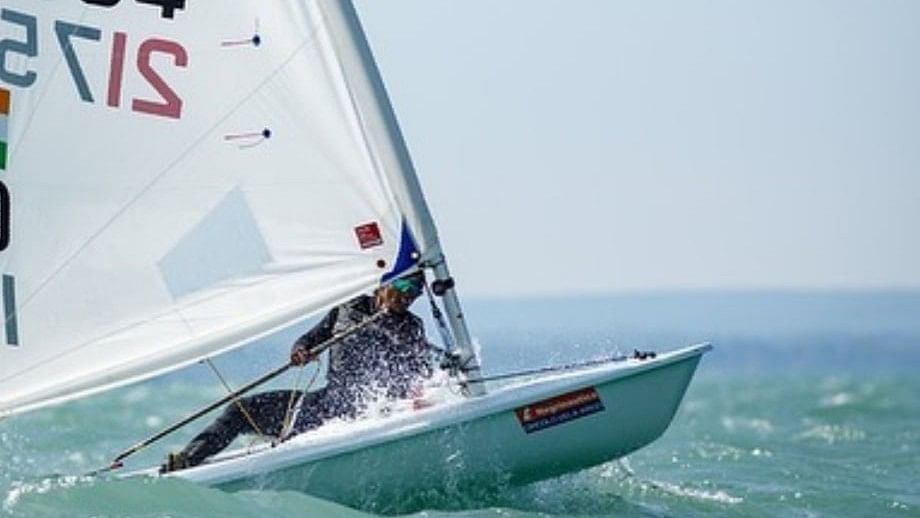
Tokyo Olympian Nethra Kumanan
Credit: Instagram/nethrakumanan
Bengaluru: As a kid an over-enthusiastic Nethra Kumanan dabbled her hands at various things. In the field of sports, she was engaged in basketball, swimming, tennis, skating and mountain biking. She even learnt Bharatanatyam under the tutelage of renowned Alarmel Valli. If all this didn’t keep her busy, she also pursued arts and even tried kalaripayattu, a form of martial art in Kerala.
However, she found her calling in sailing. A chance summer training camp in 2010 organised by the Tamil Nadu Sailing Association in Chennai ignited the hidden desire, and it only grew stronger after she qualified for the 2014 Asian Games in Incheon.
Since then, there’s been no looking back for the 26-year-old who is set to compete in her second Olympics in Paris. Nethra, who in Tokyo created history by becoming the first Indian woman sailor to compete at Olympics, is geared up to put on a strong show in the women’s one person dinghy (ILCA 6) event although she knows it’s going be tough.
In an exclusive chat with DH, Nethra, who is supported by Dream Sports Foundation, talks about her Paris ambitions, what made sailing her passion and the potential for India to become big in sailing given the vast coastline. Excerpts:
How does it feel to be competing in your second Olympics in a very niche sport like sailing?
It’s been my life for the past 10 years. I’ve based myself out of Europe for the last 10 years and here it doesn’t seem like a niche sport. It’s obviously an honour to be able to represent your country in the Olympics. This time we’ve had the opportunity to train at the venue, to get accustomed to the conditions here and I’ve already been exposed to the Olympics. I’m way better prepared to compete in Paris than Tokyo.
What’s your goal for the Paris Olympics?
Qualifying for Tokyo Olympics itself was a goal and having achieved it, I was overwhelmed by the occasion. It’s something that I’ve worked on in the last three years. Now I know what is expected at the Olympics and I’m a lot more prepared. We are at the venue preparing. My expectations are higher, definitely. When it comes to the Olympics, most of them come with the ambition of winning a medal, so there’s a lot more pressure. As I said, I’m better prepared to deal with it. Hopefully, a good result comes my way.
As a kid you dabbled in various sports and even learnt Bharatanatyam. What prompted you take up sailing?
As kids, my parents encouraged both me and my brother to take up extra-curricular activities to keep ourselves engaged when we were not in school. So we were doing a lot of things like Bharatanatyam, learning to play the piano, was in arts as well. We played a lot of sports too and sailing was one of the later ones we took up. I was in the 10th standard when I first started sailing. Initially, it was only during the weekends but as our interest grew, it started to take a lot of time from us. So we slowly let go of everything else and became addicted to sailing. In sailing, it’s just you and a boat in a vast ocean. It’s something you don’t experience in other sports. That was the basic allure to it. I qualified for the 2014 Asian Games in Incheon and since I couldn’t attend full-time school, sailing became the No. 1 priority in my life.
How does it feel to be a trend-setter in a sport that is pursued only by a select few in the country?
If you put it like that, it obviously feels great. India has a large coastline and sailing has the potential to become big. However, I’m just focussed on my journey and trying to be the best in what I do.
You said India has a vast coastline but sailing is still not a mass sport. What needs to be done for it to become more popular?
In Europe, as compared to India, it’s part of their culture, part of their lifestyle. School kids spend their evenings sailing, they have a lot more exposure to the sport as compared to us. Even on a stretch like the Marina Beach in Chennai, you’ll find an average of three sailing clubs in Europe. That’s how popular sailing is in Europe. Take Vishnu Saravanan for example, he’s top-12 in the world. He’s capable of getting a good result at the Games. India has beautiful sailing conditions all through the year as compared to Europe where it’s cold and can be brutal at times. Sailing is more accessible than what many people think. Problem is lack of sailing clubs as compared to say cricket academies.
Your dad is an IT entrepreneur and mother a successful HR professional. So was there any inhibition when you said you wanted to become a professional sailor?
In any Indian household the priority is education, get a good job and settle down. But when the Asian Games happened, we had to choose either school or sailing. We chose sailing because going to the Asian Games is no small achievement. So obviously that decision was not difficult. My coaches also felt I was talented and my parents were quite supportive. It has taken a lot of sacrifice but I’m happy to have pursued this and they’ve never been hesitant.